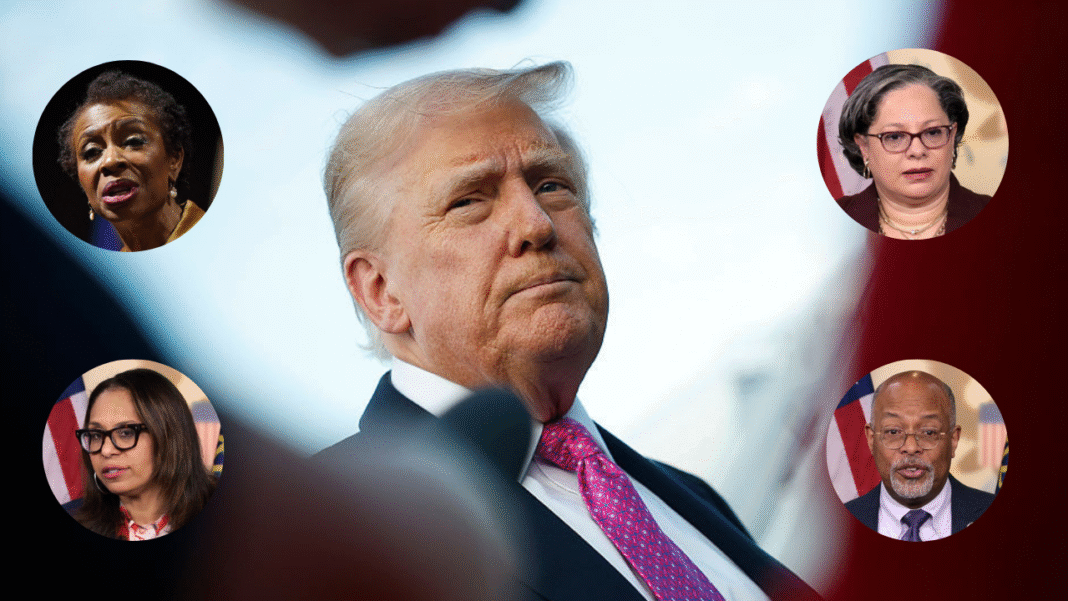The Congressional Black Caucus and Its Fight for Justice
As the Congressional Black Caucus (CBC) convenes for its 54th Annual Legislative Conference in Washington, D.C., members are acutely aware of the complexities they face as a minority in Congress. The ongoing political climate, dominated by President Donald Trump’s administration and the Republican Party, poses significant challenges for CBC members striving to advocate for marginalized communities.
The Challenge of Message Amplification
U.S. Rep. Yvette D. Clarke, the chairwoman of the CBC, highlighted the difficult reality of being a minority in the House. “When you’re in the minority, not only doesn’t your message get amplified, but it can be immediately overshadowed or sidelined by Trump’s narrative,” she expressed during a press conference with Black journalists. The constant stream of commentary from Trump, often built on misinformation, significantly impedes the efforts of the caucus to convey truthful, impactful messages.
Clarke elaborated on the dynamics at play: “It doesn’t even have to be something substantial. Anything he says can derail our attempts to uplift our community.” This situation is exacerbated by a media landscape that often prioritizes sensationalism over substantive discussions, limiting the CBC’s reach.
Navigating a Bipartisan Drought
Interestingly, some Republican lawmakers have privately conveyed their concerns about Trump’s more extreme policies. Yet, according to Clarke, the era of bipartisan collaboration has largely evaporated. “We have to be very concentrated in our efforts to deliver our message to Black communities, irrespective of their representation,” she asserted.
This shift underscores the need for CBC members to carve out their own paths to connect with constituents. U.S. Rep. Glenn Ivey echoed this sentiment, noting that constituents are actively searching for elected officials who “fight back” against oppressive policies. “One lady said to me, ‘I’m glad you all are always the adults in the room, but now we need a fighter in the ring,’” Ivey reported. This demand for a more aggressive stance reflects a growing frustration with perceived inertia within the Democratic Party.
The Role of Activism vs. Legislation
While there’s a clear expectation for lawmakers to take decisive action, Clarke emphasized the CBC’s primary responsibility as legislators rather than activists. “People often impose roles on us that we simply cannot fulfill. Our main job is legislative work, not street activism,” she stated, underscoring the importance of collaboration with the activist community to create momentum.
Ivey highlighted feedback from constituents, particularly during the CBC’s recent bus tour, where many questioned, “Where ya’ll been the last four years?” This inquiry raises critical issues around visibility and involvement, revealing the need for improved outreach before the elections.
Rethinking Political Strategies
CBC members, including Reps. Sydney Kamlager-Dove and Jennifer McClellan, stressed the urgency of overhauling traditional campaign strategies. They critiqued the Democratic National Committee’s last-minute advertising blitzes, acknowledging that such tactics are outdated in an era where digital communication dominates.
Ivey noted, “There has to be a big, grassroots effort that continues year-round. The electronic equivalent of that is podcasts, social media, and other digital platforms.” This shift emphasizes the necessity of adapting to new media landscapes to effectively engage with voters.
Adapting to Changing Media Landscapes
The group’s discussions also highlighted the evolving nature of news consumption. McClellan pointed out that many constituents aren’t relying on traditional news sources anymore. “They’re getting news from other avenues, so we need to find out how to get our information to those channels,” she explained.
The rapid transformation of communication strategies presents challenges for CBC members as they strive to maintain relevance in a landscape where consumers and seekers of news often diverge. Recognizing these dynamics is crucial for fostering connections with broader audiences.
Looking Ahead to 2026
As the CBC prepares for the approaching 2026 midterm elections, the stakes are high. Donald Trump has already initiated efforts to redraw congressional maps to favor Republican candidates, disproportionately impacting CBC members. The urgency to mobilize their constituents is palpable as Democrats aim to reclaim control of the House.
Using a sports metaphor, Kamlager-Dove described the current political climate as just entering the “first quarter.” She emphasized the necessity of continual engagement to prepare for upcoming electoral battles. “The more we discuss what’s at stake, the better we can prepare folks for the next challenges,” she remarked, a sentiment echoed by her fellow leaders.
Engaging Communities through Strategy
Reflecting on the past elections, Kamlager-Dove pointed out that many constituents, including some Black individuals, chose to support Trump. The task of re-engaging these communities will require innovative strategies, including partnerships with community organizations and legal entities to advocate for their interests effectively.
“From our strategy to engage with community-based organizations to building outrage through targeted outreach, we are committed to unwinding the narrative that has misled voters,” she concluded.



